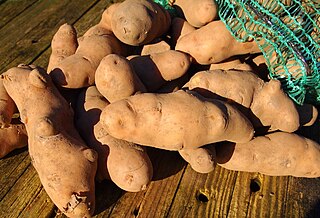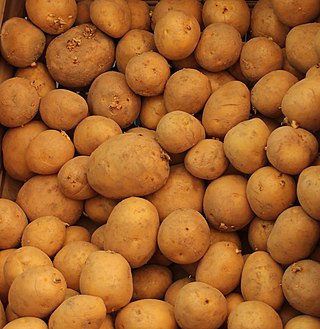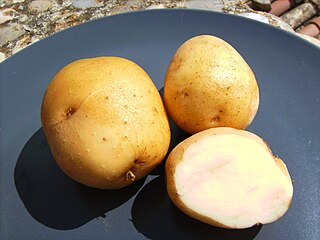Related Research Articles

The potato is a starchy root vegetable native to the Americas that is consumed as a staple food in many parts of the world. Potatoes are tubers of the plant Solanum tuberosum, a perennial in the nightshade family Solanaceae.

Potato bread is a form of bread in which potato flour or potato replaces a portion of the regular wheat flour. It is cooked in a variety of ways, including baking it on a hot griddle or pan, or in an oven. It may be leavened or unleavened, and may have a variety of other ingredients baked into it. The ratio of potato to wheat flour varies significantly from recipe to recipe, with some recipes having a majority of potato, and others having a majority of wheat flour. Some recipes call for mashed potatoes, with others calling for dehydrated potato flakes. It is available as a commercial product in many countries, with similar variations in ingredients, cooking methods, and other variables.

Russet Burbank is a potato cultivar with dark brown skin and few eyes that is the most widely grown potato in North America. A russet type, its flesh is white, dry, and mealy, and it is good for baking, mashing, and french fries (chips). It is a common and popular potato.

Yukon Gold is a large cultivar of potato most distinctly characterized by its thin, smooth, eye-free skin and yellow-tinged flesh. This potato was developed in the 1960s by Garnet ("Gary") Johnston in Guelph, Ontario, Canada, with the help of Geoff Rowberry at the University of Guelph. The official cross bred strain was made in 1966 and 'Yukon Gold' was finally released into the market in 1980.

Kerr's Pink is a potato cultivar in wide production in Ireland and the United Kingdom and many other countries. Although often quoted as an "Irish potato", the cultivar was actually created by J. Henry of Cornhill, Scotland, in 1907.
Anya is a variety of potato that was bred at the Scottish Crop Research Institute, which has rights over the variety which expire in 2026. Anya is a cross between the varieties Désirée and Pink Fir Apple, and it was named after Lady Sainsbury, and as of 2024 they were exclusively available commercially from Sainsbury's supermarkets.
Bloomer is a potato variety. Bloomers produce round purplish-blue tubers with fairly deep eyes. The flesh is cream coloured.
Mizen is a high-yielding creamy yellow skinned potato that produces long, smooth-skinned tubers with good resistance to foliar and tuber blight. Flesh is white with medium dry-matter content. Mizen is one of the potato varieties bred in the 1970s at Teagasc Oak Park breeding centre in County Carlow, Ireland.
British Queen is a variety of potato that was bred by Archibald Finlay.
Black Champion is a variety of potato with purple skin colour that produces round, flattened tubers. Davidson (1936) described this as an old variety found growing in the Midlands of Ireland but of no commercial value. Noted by Kehoe (1986) as being unique to the Irish potato collection.
Skerry Champion is a variety of potato with a round-to-oval shape and creamy yellow skin with a beautiful blue/purple "birthmark" colouring. 'Skerry Champions' have only recently become available to growers again after a long period of absence due to a host of viral diseases it was carrying. Taste quality is excellent with a lovely flavour and floury texture. They are quite highly resistant to blight however the tops of diseased haulms should be removed to keep tubers healthy. It has also been known as Buchan Beauty and although introduced into Ireland in 1922, may have existed in the UK before then.

Irish White is a variety of potato that was traditionally grown in County Donegal and Antrim. It was raised by Robert Christie of Ballytaggart about 1882.

The Pink Fir Apple potato is a maincrop potato variety with a long knobbly shape, pink skin, and creamy waxy flesh. Its shape makes it difficult to peel.

Gala is an early-ripening firm-fleshed edible potato, for which good eating and keeping qualities are claimed. It was developed by the Groß Lüsewitz-based plant breeder Norika. In 2010, it was chosen as Thuringia's potato of the year in a public contest to which nearly 1000 consumers contributed, and in which Laura was second place.
Champion is a potato variety bred by John Nicoll in Scotland and widely grown in Ireland during the latter half of the 19th century. The tuber is round, with white skin and yellow flesh. The texture is described as "floury".

Kennebec is a medium- to late-maturing white potato. It was bred by the USDA and selected by Presque Isle Station, Maine, in 1941. Kennebec is not under plant variety protection. This fast-growing variety has high yields. It maintains good quality in storage and is grown for both fresh market use and for potato chip manufacturing.

Northern Irish cuisine encompasses the cooking styles, traditions and recipes associated with Northern Ireland. It has distinctive attributes of its own, but has also drawn heavily from Irish and British cuisines.

James Clark, was an English market gardener and horticulturist in Christchurch, Dorset who specialised in raising new varieties of potato. His most noted success was Magnum Bonum, described by The Times as "the first real disease-resisting potato ever originated and offered to the world".
Will Bonsall is an American author, seed saver and veganic farmer who lives in Maine. He is a regular speaker about seed saving, organic farming and veganic farming.

Nigeria is one of the largest producers of potatoes in Africa. The potato was introduced to the country in the 19th century by Christian missionaries and is largely cultivated in the central region of the country in Plateau State.
References
- ↑ "Varieties".
- ↑ Irish Seed Savers Spring 2010 Seed List
- ↑ "The European Cultivated Potato Database". www.europotato.org. Retrieved 1 December 2016.
